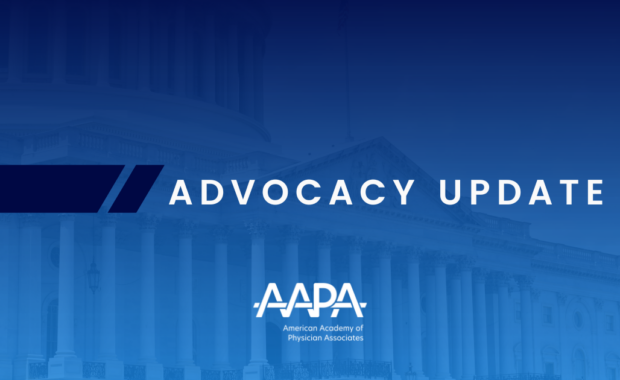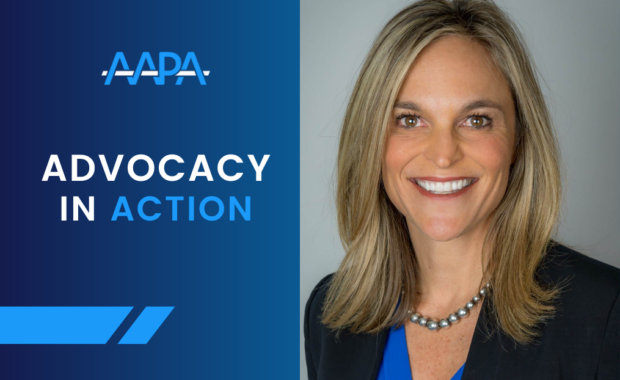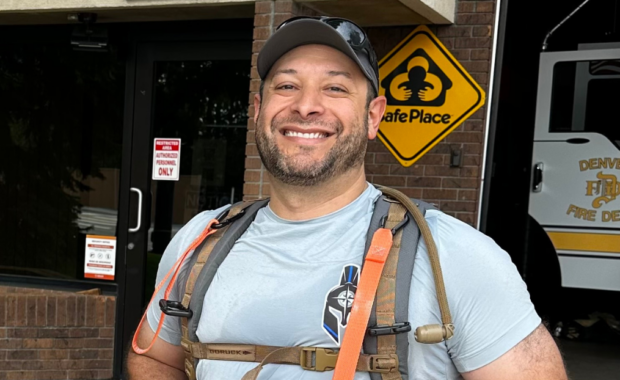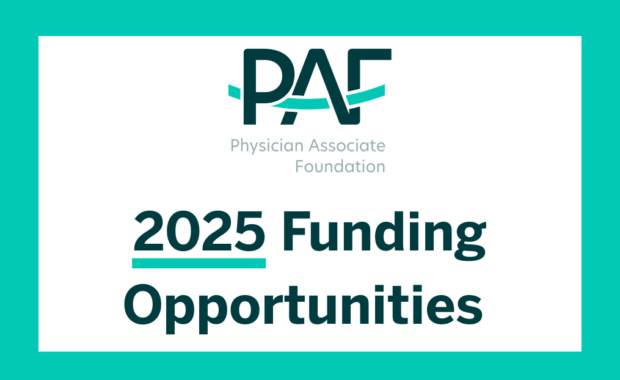Mental Health is Part of Everyone’s Health: Psychiatry PA Jessica Tabb Wants to Change the Narrative Around Mental Health Care
Every PA Has a Part to Play in Expanding Access to Mental Health Care, Tabb Says
February 21, 2023
By Sarah Blugis

In the United States, 160 million people live in areas without adequate access to mental health care, according to the Health Resources and Services Administration. Few understand firsthand the consequences of this shortage more than Jessica Tabb, a psychiatry PA who practices at Community Healthcare Solutions in Hampton Roads, Virginia.
For patients seeking professional help for their mental health, the search for a provider can be difficult. “Mental health care is so scarce right now. It’s so hard, in almost every area, to find a mental health provider at all,” Tabb says.
Other patients, she explains, may feel like they don’t need mental health care. If their mental health declines, they may seek care in already overcrowded emergency departments and receive outpatient treatment. Often, Tabb says, those patients then fall through the cracks, especially when it can take months for them to secure a follow-up appointment with a mental health care professional.
“If we can prevent people from having these mental health crises, we’re actually in turn helping our communities. If one person has better mental health, their family will have better mental health. That patient can be more functional, work, and contribute to their community,” Tabb says.
[Stay connected to your PA community – join or renew your membership today]
Pursuing a Career in Psychiatry
Originally, Tabb intended to pursue a career in pharmacy. As she learned more about the PA profession, she quickly realized that it was a good fit for her – and that it would also provide her the opportunity to practice in a specialty that holds significance for her. She has personal experience with mental health, she says, and so do some of her close friends, family, and colleagues, which piqued her interest in pursuing psychiatry.
“Growing up, especially in my family and culture, mental health wasn’t really talked about at all or understood. But the more I grew up and had different experiences, I realized that mental health touches everyone,” Tabb says. “Mental health is part of everyone’s health, just like physical health is part of everyone’s health.”
Since she began practicing as a psychiatry PA, Tabb has worked with a wide variety of patients in various settings. Early in her career, she practiced in an outpatient medical office, where she worked with both children and adults. She then transitioned to working with geriatric patients in assisted living facilities and has experience treating patients in inpatient care facilities.
[Learn more about how PAs Go Beyond]
In her current role, Tabb treats patients ranging in age from pediatric to geriatric. The vast majority of her patients are dealing with mood disorders like depression, anxiety, and bipolar – but she sees a lot of patients also struggling with trauma and substance use disorder.
COVID-19, she says, only increased her patient load, especially as she began working with patients virtually through telehealth appointments. “It was a lot. There was a sharp increase in suicidality in children and adults. It hit hard for us when COVID hit.”
The PA Role in Mental Health
According to the 2022 AAPA Salary Survey, 2.3% of PAs list psychiatry as their primary specialty. In reality, though, PAs diagnose and treat behavioral and mental health issues across all practice settings – and therefore, PAs in many other settings and specialties are critical to helping patients access mental health care. While she acknowledges that practicing in psychiatry isn’t for everyone, all PAs, Tabb says, should be thinking about their patients’ mental health.
“A lot of times, the thought process is that there are ‘regular’ patients and ‘mental health’ patients. And that’s not true,” Tabb says. “Don’t forget to continue to educate yourself in psychiatry so that you can more easily pinpoint patients who need escalation to psychiatric care.” AAPA has a Behavioral and Mental Health Toolkit that includes CME, tools, and resources readily available for PAs.
Along with that education, Tabb emphasizes the importance of PAs getting involved in their state chapters to help advocate for laws and regulations that will help increase patient access to care, including mental health care.
Tabb also says it’s important for all PAs to begin or continue their cultural competency journey to ensure they’re providing equitable care for everyone. Mental health, Tabb says, is an area where under-resourced groups tend to have increased difficulty accessing care.
Factors like location and insurance status can have significant effects on how or whether patients receive care. Compounding that, in psychiatry, observed symptoms can be interpreted differently by different providers, Tabb says. This means that a patient’s behavior may be described as “restless” by one provider, but “aggressive” by another, which can impact the type of care they receive.
“It’s important to understand the complexity of each patient and their needs. Maybe they need help getting to appointments. Maybe they don’t have internet access. Maybe they don’t understand the need for medication,” Tabb says.
Advocating for Equity in Mental Health Care
Treating each patient as an individual is crucial, especially with those for whom trust in healthcare providers is an issue. For example, Tabb says, the history of how diagnoses of mental illness were used against Black patients has left some still wary of mental health care.
“Part of it is definitely related to culture itself, and being African American, I understand that,” Tabb says. During her time working in a Federally Qualified Health Center, Tabb explains that some patients were reluctant to receive care after hearing the word “psychiatry,” insisting that was something they didn’t want or need.
“But when you take the time to talk to someone and let them know that we’re going to come up with a plan together – that I’m not going to do anything to them that they don’t want done – and let them know that my goal is to help them, I’ve seen that patients are then more receptive to care,” she says. “Some have told me that other providers even recommended the same treatment, but they didn’t trust them or feel comfortable.”
Bridging these gaps and improving health equity is something Tabb is passionate about, which is part of the reason why she joined the AAPA Commission on Diversity, Equity, and Inclusion, an experience she says has helped her learn a lot from other experienced PAs. Tabb also works with the Opioid Response Network, a nonprofit that helps educate clinicians about opioid use disorder (OUD).
She is also particularly interested in equity for the neurodivergent population and self-published a children’s book on ADHD, something she hopes to help people better understand.
“A lot of people, even clinicians, think [ADHD] is just about children not being able to focus,” Tabb says. “That doesn’t encompass all of the symptoms, and it can become a troubling issue for adults who were never diagnosed in childhood.”
Untreated ADHD can lead to problems at work and in relationships, and can lead to depression. Tabb hopes that she can help more people recognize the real symptoms of ADHD, leading to earlier detection and the appropriate treatment. Overall, her mission is to help more patients receive care for their individualized needs in a non-judgmental space – and to encourage people to prioritize their mental health.
“It’s very rewarding when I see someone able to function better in life because of my help,” Tabb says. “So, I love to advocate for people to better understand that in order to take care of yourself, you cannot neglect your mental health.”
You May Also Like
AAPA’s Behavioral and Mental Health Toolkit
AAPA’s Diversity, Equity, and Inclusion Resource Center
Focused on Efficiency: PA Kevin Riddleberger Develops In-Home, High-Acuity Care Delivery Model
From Addiction and Tragedy, PA Josh Thornhill Treats Body and Soul
PA Katherine ‘Kaesa’ GeeBah Footracer Believes Healthcare Can Make the World a More Equitable Place
Thank you for reading AAPA’s News Central
You have 2 articles left this month. Create a free account to read more stories, or become a member for more access to exclusive benefits! Already have an account? Log in.



